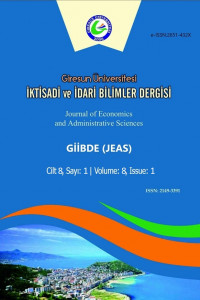The Relationship Between Education and Development In Turkey And Selected OECD Countries: Evidences With The ARDL Model
Abstract
The term economic development simply refers to the welfare level of each individual that makes up the society. The welfare level of the individual is related to the social and economic structure he has. The process of creating a deliberate, desired behavior change in an individual's behavior is expressed as education. With education, it is possible to increase people's knowledge and experience, to ensure their socialization, and to ensure that the economic structure changes and develops. The most important human capital of economic development and economic growth is human. Making human capital productive with a well-educated means an increase in qualified workforce. Constantly changing production techniques and technological innovations necessitate this. In this study, improved analyzes of education expenditures of Turkey and OECD countries that improve GDP were made. The relationship between Turkey and selected OECD countries' education expenditures between 1985 and 2015 and economic development was analyzed using ARDL bounds test approach. The long-term and short-term relationship between education expenditures and economic development variables were examined, and then Toda-Yamamoto causality analysis was performed between the variables. As a result of the analyzes made, it has been seen that although there are fluctuations in the short-term relationship, where there is a long-term positive relationship between Education expenditures on Economic Development, it can reach equilibrium in the long-term. In addition, a bidirectional causality relationship has been determined between education expenditures and economic development variables.
References
- Adams, D. (1965). Education and the wealth of nations. Phi Delta Kappan, 47(4), 169-174.
- Bal, H., (2014). Beşeri Sermaye Ve Ekonomik Büyüme ilişkisi: BRICS Ülkeleri Ve Türkiye Örneği, International Conference on Eurasian Economies.
- Dickey, D.A. and W.A. Fuller (1979). Distribution of the Estimators for Autoregressive Time Series with a Unit Root. Journal of the American Statistical Association, 74, 427–431.
- Erol, S. Y. ve Sevinç, H. (2021), “Eğitim ve Kalkınma İlişkisi: TRA2 Bölgesi Örneği”, Journal of Yasar University,16/64, 1787-1807.
- Han, E., Kaya, A. A., (2008). Kalkınma Ekonomisi Teori ve Politika. Nobel Yayıncılık, Ankara.
- İzolluoğlu, C., (2019). Zaman Serisi Birim Kök Testleri ve Bir Uygulama. Yüksek Lisans Tezi, İnönü Üniversitesi, Sosyal Bilimler Enstitüsü, Malatya.
- Kavak, Y., ve Burgaz B., (1994). Eğitim Ekonomisi Seçilmiş Yazılar. Pegem Yayın No:14, Ankara.
- Schultz, T, W., (1961). Investment in Human Capital;A Reply. The American Economi Review, 51(5).
- Toda, H. Y., ve Yamamoto, T., (1995). Statistical İnference İn Vector Autoregressions With Possibly İntegrated Processes. Journal of Econometrics, 66(1-2), 225-250.
- Ünal, L. I., (1996). Eğitim ve Yetiştirme Ekonomisi. Epar Yayınları, Torun Matbaası, Ankara.
TÜRKİYE VE SEÇİLMİŞ OECD ÜLKELERİNDE EĞİTİM VE KALKINMA İLİŞKİSİNİN SINANMASI: ARDL MODELİYLE KANITLAR
Abstract
İktisadi kalkınma terimi basit bir ifade ile toplumu oluşturan her bireyin refah düzeyini ifade etmektedir. Bireyin refah düzeyi sahip olduğu sosyal ve ekonomik yapı ile ilişkilidir. Bireyin davranışlarında kasıtlı istendik davranış değişikliği oluşturma süreci eğitim olarak ifade edilir. Eğitim ile insanların bilgi ve birikimlerini arttırmak, sosyalleşmelerini sağlamak, ekonomik yapının değişip gelişmesini sağlamak mümkündür. İktisadi kalkınma ve ekonomik büyümenin en önemli beşeri sermayesi insandır. İnsan sermayesinin iyi eğitilmiş olarak verimli hale getirilmesi nitelikli işgücünün artması demektir. Sürekli değişen üretim teknikleri ve teknolojik yenilikler bunu gerekli kılmaktadır. Bu çalışmada Türkiye ve OECD ülkelerinin yaptıkları eğitim harcamaları ile GSYH büyüme oranının karşılaştırmalı bir analiz yapılmıştır. Türkiye ile seçilmiş OECD ülkelerinin 1985-2015 yılları arasında yaptıkları Eğitim harcamaları ile İktisadi kalkınma ilişkisi ARDL sınır testi yaklaşımı kullanılarak analiz edilmiştir. Eğitim harcamaları ve İktisadi kalkınma değişkenleri arasındaki uzun dönem ve kısa dönem ilişkisine bakılmış daha sonra değişkenler arasında Toda-Yamamoto nedensellik analizi yapılmıştır. Yapılan analizler neticesinde Eğitim harcamalarının İktisadi Kalkınma üzerinde uzun dönemli pozitif etkisinin olduğu, kısa dönemde ise dalgalanmalar olsa da uzun dönemde dengeye gelebileceği görülmüştür. Ayrıca eğitim harcamaları ile iktisadi kalkınma değişkenleri arasında çift yönlü bir nedensellik ilişkisi tespit edilmiştir.
References
- Adams, D. (1965). Education and the wealth of nations. Phi Delta Kappan, 47(4), 169-174.
- Bal, H., (2014). Beşeri Sermaye Ve Ekonomik Büyüme ilişkisi: BRICS Ülkeleri Ve Türkiye Örneği, International Conference on Eurasian Economies.
- Dickey, D.A. and W.A. Fuller (1979). Distribution of the Estimators for Autoregressive Time Series with a Unit Root. Journal of the American Statistical Association, 74, 427–431.
- Erol, S. Y. ve Sevinç, H. (2021), “Eğitim ve Kalkınma İlişkisi: TRA2 Bölgesi Örneği”, Journal of Yasar University,16/64, 1787-1807.
- Han, E., Kaya, A. A., (2008). Kalkınma Ekonomisi Teori ve Politika. Nobel Yayıncılık, Ankara.
- İzolluoğlu, C., (2019). Zaman Serisi Birim Kök Testleri ve Bir Uygulama. Yüksek Lisans Tezi, İnönü Üniversitesi, Sosyal Bilimler Enstitüsü, Malatya.
- Kavak, Y., ve Burgaz B., (1994). Eğitim Ekonomisi Seçilmiş Yazılar. Pegem Yayın No:14, Ankara.
- Schultz, T, W., (1961). Investment in Human Capital;A Reply. The American Economi Review, 51(5).
- Toda, H. Y., ve Yamamoto, T., (1995). Statistical İnference İn Vector Autoregressions With Possibly İntegrated Processes. Journal of Econometrics, 66(1-2), 225-250.
- Ünal, L. I., (1996). Eğitim ve Yetiştirme Ekonomisi. Epar Yayınları, Torun Matbaası, Ankara.
Details
| Primary Language | Turkish |
|---|---|
| Subjects | Economics |
| Journal Section | Research Article |
| Authors | |
| Translators | |
| Publication Date | June 30, 2022 |
| Submission Date | May 29, 2022 |
| Acceptance Date | June 17, 2022 |
| Published in Issue | Year 2022 Volume: 8 Issue: 1 |
Cited By
XI. Kalkınma Planı’nda Eğitim Politikaları: Milli Eğitim Bakanlığı’nın Görevleri Nelerdir?
Uluslararası İktisadi ve İdari İncelemeler Dergisi
https://doi.org/10.18092/ulikidince.1227445
- Journal of Economics & Administrative Sciences


